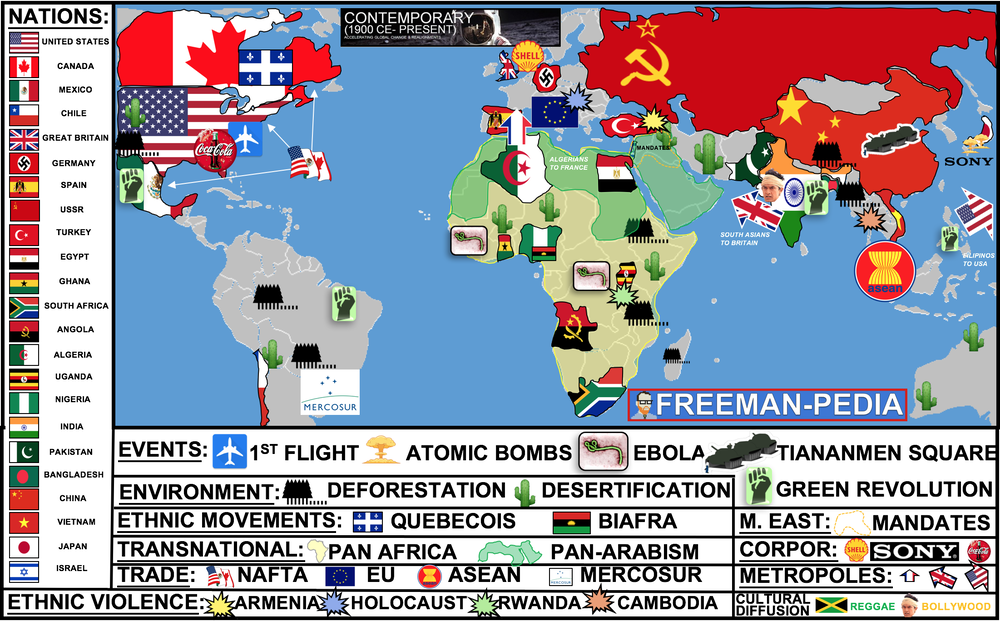8.6 Newly Independent States After 1900
4 min read•january 13, 2023
K
Katie Moore
AP World History: Modern 🌍
577 resourcesSee Units
Israel 🇮🇱
Israel is probably the most well-known example of a state that emerged in this period, so let’s dig into it a little bit!
Pretty much since the beginning of Judaism, Jewish people were in diasporic communities-- groups of people united by ethnicity or religion that are scattered instead of centralized in one place like a state. At any rate, after the horrors of WWII, Jews began to demand that they get their own nation. This idea of a Jewish state is called Zionism.
After previously stated European support for this idea, such as the British Balfour Declaration, the United Nations created Israel in 1948 by carving it out of Palestine. As a result, there was a lot of Jewish immigration to Israel.
As you can imagine, Palestinians (and other Arab countries) weren’t happy at all about this. Essentially, ever since Israel was created, Israel and Arab (specifically Palestine) have been at war. Only a few examples of these are the Yom Kippur War and the Six-Day War.
Cambodia🇰🇭
Remember how Vietnam was taken over by Japan in World War 2? Well, the region Vietnam was a part of at the time (French Indochina) also included what we now know as Cambodia. Similar to Vietnam, once the war was over, France tried to retake it, and Cambodia refused.
However, it wasn’t over there. Authoritarian leaders in Cambodia grappled for power, and the resulting political chaos led to communists gaining power, leading to the Khmer Rouge, a notoriously violent group.
During the time the Khmer Rouge was in power, they aggressively attempted to make the country agricultural again by forcefully collectivizing farms. This, accompanied by many other violent techniques such as murdering anyone suspected of dissent, killed about 1.5 million people in the Cambodian genocide.
Pakistan🇵🇰
We briefly touched on this in our discussion of India, but let’s go a little deeper. As you already know, India gained independence, but it wasn’t that easy.
Along with the INC (Indian National Congress, as you no doubt recall), there was the Muslim League, a group of Muslims living in the area that called for Muslim Indian separation from India led by Muhammad Ali Jinnah. They were worried that the Hindu majority of India would always overpower the Muslim interest.
After some debate, it was agreed: there would be a partition of the newly independent state. The larger one would remain India, and the smaller one would become Pakistan, for Muslims.
Of course, Muslims wanted to move to Pakistan. But they had to get across India first. This mass migration of Muslims to Pakistan grew from messy to downright bloody, and by the time the partition of India and Pakistan was complete, two million were dead.
Economic Systems in the New States
Of course, each of these new states adapted to the globalizing economy in different ways. Let’s get into it!
In India, Indira Gandhi demolished the private sector by nationalizing parts of the economy such as banks, the insurance sector, and the coal industry. Investors and entrepreneurs essentially had to get governmental permission before doing anything. This is definitely one of the more extreme examples of governmental involvement in the economy.
Gamal Abdel Nasser’s economic development in Egypt was a little different. His biggest goal during his period of control over Egypt was modernizing the nation. He was the guy who nationalized the Suez Canal if you remember that. But he did a lot more: he also encouraged the growth of the middle class and broke up large estates.
In Tanzania, Julius Nyerere also tried to modernize, but in Tanzania. He collectivized large farms, but also heavily promoted education. At his urging, Tanzania created universal education, vastly increasing literacy.
The last one is Sirimavo Bandaranaike's policies in Sri Lanka. Unlike India, she promoted free enterprise, though she did nationalize some industries. With her help, the wealth gap in Sri Lanka declined immensely.
Migrations➡️⬅️⬆️⬇️
No matter where, in this period, migrations were largely motivated by escaping economic or political crises at home. That being said, here are a couple of examples.
South Asians to Britain
Filipinos to the U.S.
Algerians to France

REVIEW GAME: True or False
- The Indian National Congress, or INC, pushed hardest for the creation of a Muslim state by the partition of India (False-- it was the Muslim League)
- Zionism was the idea that Indian Muslims deserved their own state (False-- it was the idea that Jews deserved their own state)
- The communist Khmer Rouge took over Cambodia and their violent methods caused the Cambodian Genocide (True)
- Indira Gandhi was for little governmental involvement in the economy (False-- she essentially destroyed the private sector and heavily employed governmental control in the economy)
- Israeli-Palestinian conflicts have been continuing ever since the creation of Israel in 1948 (True)
- Muhammad Ali Jinnah led the Muslim League (True)
Browse Study Guides By Unit
🐎Unit 1 – The Global Tapestry, 1200-1450
🐫Unit 2 – Networks of Exchange, 1200-1450
🕌Unit 3 – Land-Based Empires, 1450-1750
🍕Unit 4 – Transoceanic Interactions, 1450-1750
✊🏽Unit 5 – Revolutions, 1750-1900
🚂Unit 6 – Consequences of Industrialization, 1750-1900
💣Unit 7 – Global Conflict, 1900-Present
🥶Unit 8 – Cold War & Decolonization, 1900-Present
✈️Unit 9 – Globalization, 1900-Present
✏️Frequently Asked Questions
🚀Thematic Guides
🗺Regional Guides
🤓Historical Thinking Skills
🧐 Multiple Choice Questions (MCQ)
📋Short Answer Questions (SAQ)
📝Long Essay Questions (LEQ)
📑Document Based Questions (DBQ)

Fiveable
Resources
© 2023 Fiveable Inc. All rights reserved.